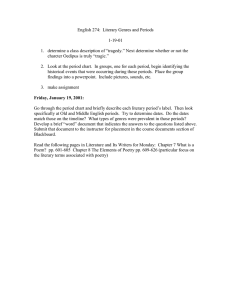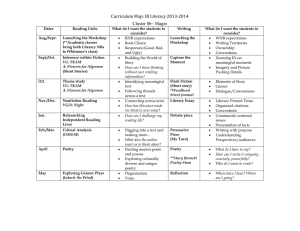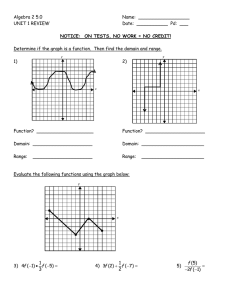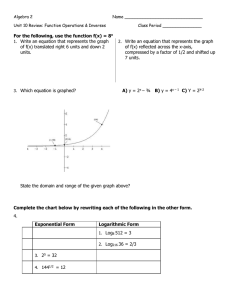CL 365: Seminar in Classical Studies Singer, Song, and Society
advertisement
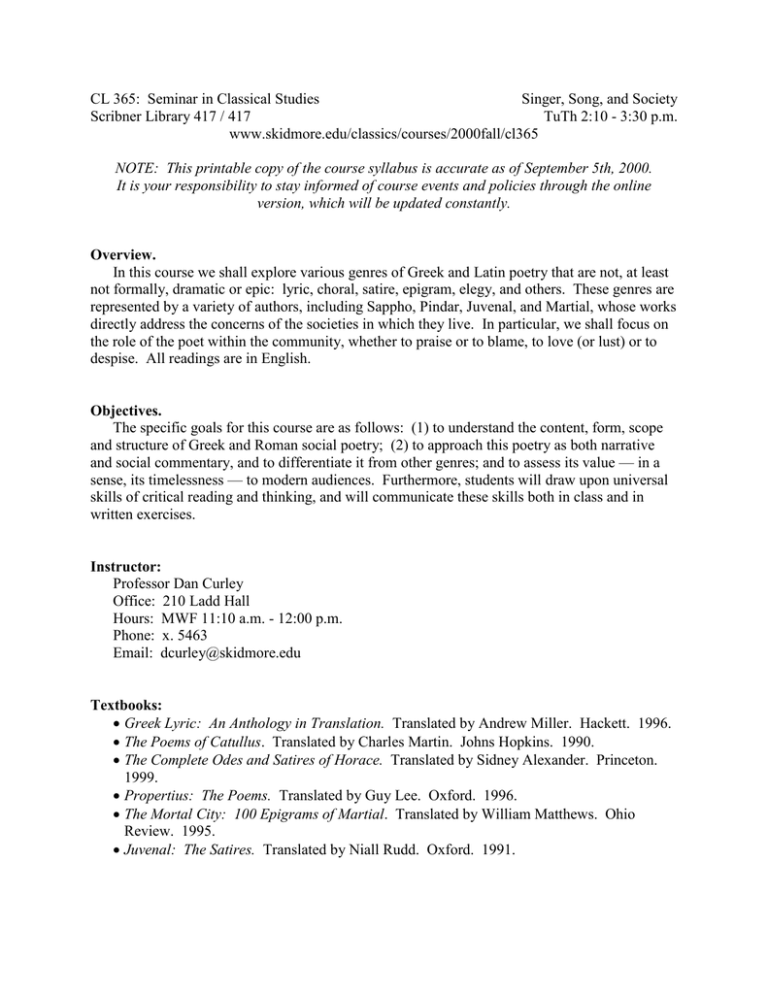
CL 365: Seminar in Classical Studies Singer, Song, and Society Scribner Library 417 / 417 TuTh 2:10 - 3:30 p.m. www.skidmore.edu/classics/courses/2000fall/cl365 NOTE: This printable copy of the course syllabus is accurate as of September 5th, 2000. It is your responsibility to stay informed of course events and policies through the online version, which will be updated constantly. Overview. In this course we shall explore various genres of Greek and Latin poetry that are not, at least not formally, dramatic or epic: lyric, choral, satire, epigram, elegy, and others. These genres are represented by a variety of authors, including Sappho, Pindar, Juvenal, and Martial, whose works directly address the concerns of the societies in which they live. In particular, we shall focus on the role of the poet within the community, whether to praise or to blame, to love (or lust) or to despise. All readings are in English. Objectives. The specific goals for this course are as follows: (1) to understand the content, form, scope and structure of Greek and Roman social poetry; (2) to approach this poetry as both narrative and social commentary, and to differentiate it from other genres; and to assess its value — in a sense, its timelessness — to modern audiences. Furthermore, students will draw upon universal skills of critical reading and thinking, and will communicate these skills both in class and in written exercises. Instructor: Professor Dan Curley Office: 210 Ladd Hall Hours: MWF 11:10 a.m. - 12:00 p.m. Phone: x. 5463 Email: dcurley@skidmore.edu Textbooks: Greek Lyric: An Anthology in Translation. Translated by Andrew Miller. Hackett. 1996. The Poems of Catullus. Translated by Charles Martin. Johns Hopkins. 1990. The Complete Odes and Satires of Horace. Translated by Sidney Alexander. Princeton. 1999. Propertius: The Poems. Translated by Guy Lee. Oxford. 1996. The Mortal City: 100 Epigrams of Martial. Translated by William Matthews. Ohio Review. 1995. Juvenal: The Satires. Translated by Niall Rudd. Oxford. 1991. CL 365: Singer, Song, and Society 2 Course requirements: Class participation (20%). Class participation involves more than just attendance. You must also keep up with the readings and assignments, and participate actively during our sessions. Furthermore, I expect that you will come to class on time and that you will maintain an environment that promotes the exchange of ideas. Article report (10%). Each student will present a 15-minute report on a scholarly article or book chapter. You will select from the bibliography or from another source, and articulate to the class (1) the author's aims, (2) his or her main lines of argument, (3) his or her conclusions, and (4) whether or not you thought the piece was successful, and why. Your presentation should be focused and polished, and should convey familiarity with the subject matter. Assessment papers (40%) In lieu of exams, I will assess your progress in the course through five brief papers. In these papers you will respond to topics relevant to the authors whose works we have most recently explored. Research project (30%). The research project has several components, including a topic statement, an annotated bibliography (four versions), an outline, two formal presentations of your topic, and the research paper itself (approx. 20 pages in length). Consult the online Timetable to see when the assignments and papers have been scheduled. Strategies for success. While everyone confronts poetry in his or her own way, it will prove worthwhile to approach the requirements of this seminar in an organized and systematic manner. Below are some strategies to consider for success in CL 365. Keep up with the workload. As simplistic as it sounds, this is perhaps the most useful strategy, as well as the most difficult to follow. Our pace will at times be rather rigorous, depending largely upon how many texts by a given author survive. This means that you should work with the poetry every day. Don't save it all for the night before. You should likewise strive to keep up with the various assignments and components of the research project. Review regularly. Again, this seems obvious, but regular review of past readings, particularly those portions of texts highlighted during our discussions, will prove extremely helpful. The same advice applies to your notes from class. Remember the genres. Not all of our authors are lyric poets. Each poet's genre differs from the other in terms of sound and sense, as well as in social function. Bear these differences in mind as you proceed I hope that you will find CL 365 to be a challenging yet rewarding experience. F O R T V N A O M N I B V S B O N A
